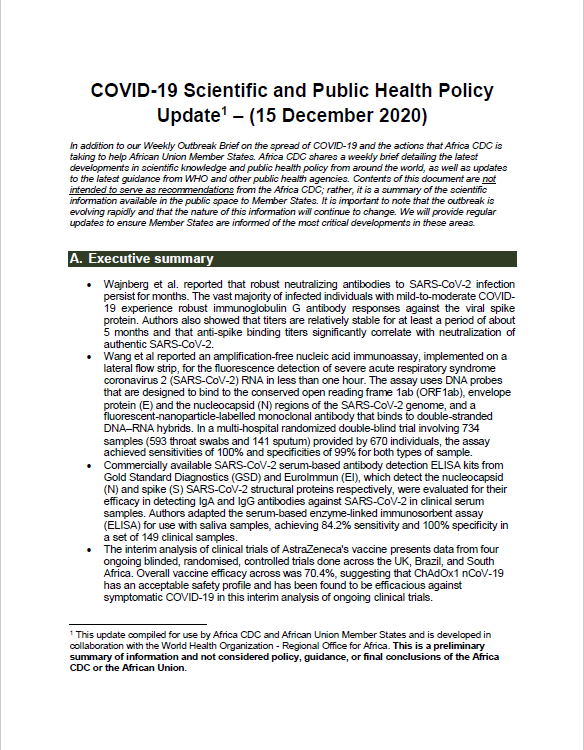In addition to our Weekly Outbreak Brief on the spread of COVID-19 and the actions that Africa CDC is taking to help African Union Member States. Africa CDC shares a weekly brief detailing the latest developments in scientific knowledge and public health policy from around the world, as well as updates to the latest guidance from WHO and other public health agencies. Contents of this document are not intended to serve as recommendations from the Africa CDC; rather, it is a summary of the scientific information available in the public space to Member States. It is important to note that the outbreak is evolving rapidly and that the nature of this information will continue to change. We will provide regular updates to ensure Member States are informed of the most critical developments in these areas.
A. Executive summary
Wajnberg et al. reported that robust neutralizing antibodies to SARS-CoV-2 infection persist for months. The vast majority of infected individuals with mild-to-moderate COVID-19 experience robust immunoglobulin G antibody responses against the viral spike protein. Authors also showed that titers are relatively stable for at least a period of about 5 months and that anti-spike binding titers significantly correlate with neutralization of authentic SARS-CoV-2.
Wang et al reported an amplification-free nucleic acid immunoassay, implemented on a lateral flow strip, for the fluorescence detection of severe acute respiratory syndrome coronavirus 2 (SARS-CoV-2) RNA in less than one hour. The assay uses DNA probes that are designed to bind to the conserved open reading frame 1ab (ORF1ab), envelope protein (E) and the nucleocapsid (N) regions of the SARS-CoV-2 genome, and a fluorescent-nanoparticle-labelled monoclonal antibody that binds to double-stranded DNA–RNA hybrids. In a multi-hospital randomized double-blind trial involving 734 samples (593 throat swabs and 141 sputum) provided by 670 individuals, the assay achieved sensitivities of 100% and specificities of 99% for both types of sample.
Commercially available SARS-CoV-2 serum-based antibody detection ELISA kits from Gold Standard Diagnostics (GSD) and EuroImmun (EI), which detect the nucleocapsid (N) and spike (S) SARS-CoV-2 structural proteins respectively, were evaluated for their efficacy in detecting IgA and IgG antibodies against SARS-CoV-2 in clinical serum samples. Authors adapted the serum-based enzyme-linked immunosorbent assay (ELISA) for use with saliva samples, achieving 84.2% sensitivity and 100% specificity in a set of 149 clinical samples.
The interim analysis of clinical trials of AstraZeneca’s vaccine presents data from four ongoing blinded, randomised, controlled trials done across the UK, Brazil, and South Africa. Overall vaccine efficacy across was 70.4%, suggesting that ChAdOx1 nCoV-19 has an acceptable safety profile and has been found to be efficacious against symptomatic COVID-19 in this interim analysis of ongoing clinical trials.
